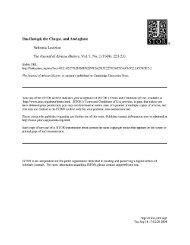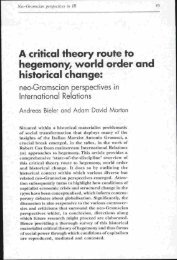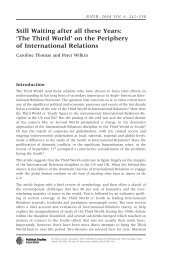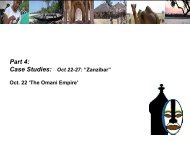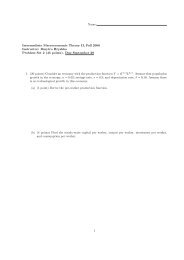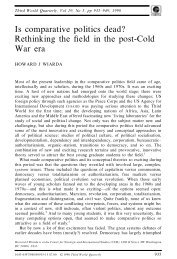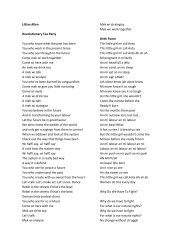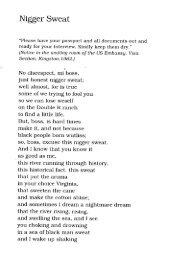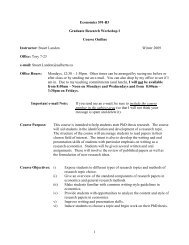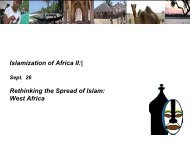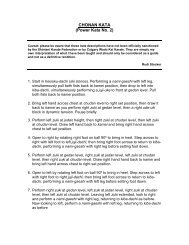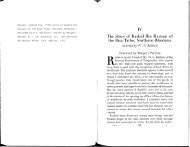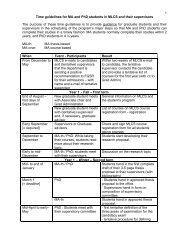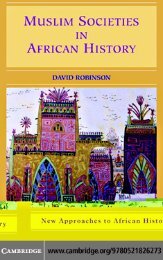personal memories revolutionary states and indian ocean migrations
personal memories revolutionary states and indian ocean migrations
personal memories revolutionary states and indian ocean migrations
You also want an ePaper? Increase the reach of your titles
YUMPU automatically turns print PDFs into web optimized ePapers that Google loves.
in “conditions of change <strong>and</strong> contest.” 41 Asad draws loosely on Foucault’s concept<br />
of the relationship between power <strong>and</strong> knowledge. Individuals <strong>and</strong> groups in a<br />
given society assert power through discourses about rights, but other individuals<br />
<strong>and</strong> groups may contest those discourses in order to assert their own place in that<br />
society. 42 By taking such an approach, we can then look at Islam <strong>and</strong> Swahili<br />
identity as ongoing construction projects couched in competing discourses between<br />
masters <strong>and</strong> slaves—discourses that, as Foucault insists, have real effects in the<br />
world. Thinking about the process in terms of discourse rather than ideology allows<br />
a more fluid <strong>and</strong> nuanced analysis than the concept of an a priori universal religion.<br />
It also allows multiple discourses to be in play at the same time.<br />
Much of Cooper’s argument draws directly from Sacred Meadows, especially<br />
the celebration of the Maulidi ya Kiswahili. 43 Maulidi, the celebration of the Prophet's<br />
birth, in Zein's work <strong>and</strong> in many studies of East <strong>and</strong> other parts of Africa, has<br />
been a favorite site for examining social relations in societies where Islam is the<br />
predominant religion. It has been analyzed as a ritual in which the power of the elite<br />
is displayed for the masses (Combs-Schilling), a sign appropriated by ex-slaves on<br />
Zanzibar to signify poetry (Fair), an example of resistance on the part of slaves<br />
(Glassman) <strong>and</strong> a ritual that maintains Arab hegemony on Pemba today<br />
(Goldman). 44 For Zein, as a major social <strong>and</strong> religious event on Lamu, it provided<br />
an insight into the social arrangements there.<br />
By the end of the nineteenth century, Lamu society had become highly<br />
stratified. At the top were the wangwana (people of the town) 45 who called<br />
themselves the Wa Yumbili. This group was divided into three. At the top were the<br />
Wa Yumbili Pembe followed by the Wa Yumbili Ngombe. At the bottom rung of the<br />
wangwana were the Wa Yumbili Ponde. Beneath these groups were the Comoros<br />
Isl<strong>and</strong>ers who were permanent outsiders <strong>and</strong> the slaves who were insiders, but<br />
without status. The manner in which each group celebrated the Maulidi signified<br />
their position in Lamu society. The Wa Yumbili Pembe <strong>and</strong> Wa Yumbili Ngombe<br />
celebrated the Maulidi Barzanji, a private <strong>and</strong> quiet ceremony performed in the<br />
mosque only by persons licensed to do so. The Wa Yumbili Ponde, the Comoros<br />
Isl<strong>and</strong>ers <strong>and</strong> the children of souriyas (concubines) celebrated their own Maulidi, the<br />
Maulidi ya Rama, in public with musical accompaniment <strong>and</strong> dancing. 46<br />
Despite exclusion by the wangwana from religious education <strong>and</strong> hence<br />
from the “traditional” celebration of the Maulidi, the slaves formed two competitive<br />
groups led by ex-slaves Mwalim Jum'ani <strong>and</strong> Bajuri <strong>and</strong> created their own ritual.<br />
This particular Maulidi was performed in Swahili <strong>and</strong> was given the name Maulidi ya<br />
Kiswahili. Performed in the elite <strong>and</strong> exclusive Langoni area of Lamu town, the two<br />
factions acquired backers from among its wangwana residents. Wangwana masters had<br />
often used their slaves in competitions against each other. In the Maulidi ya Kiswahili,<br />
however, the slaves <strong>and</strong> ex-slaves were free to chose the group to which they would<br />
belong. That created a reordering of old loyalties <strong>and</strong> identities.<br />
Initially, the wangwana used the competition between Bajuri <strong>and</strong> Jum’ani’s<br />
followers to their advantage. They became mediators between, as well as backers of,<br />
the competing ex-slave groups. When the competition became too heated, the<br />
masters would step in temporarily reasserting their power. However, over time, the<br />
role of competitor eclipsed that of mediator. Controlling the followers of Bajuri <strong>and</strong><br />
Jum’ani became less important than vying for greater status within their own group<br />
to such an extent that they began to sell their l<strong>and</strong> to pay for increasingly lavish<br />
celebrations. 47 The masters then declared the Maulidi ya Kiswahili to be unorthodox,<br />
a secular event more to do with competition than religion. The title of Mwalim<br />
Vol. 5, Fall 2005, © 2005 The MIT Electronic Journal of Middle East Studies<br />
16



